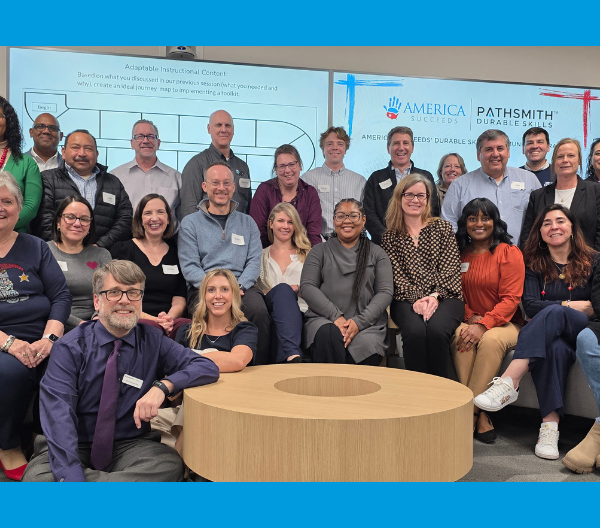As we dive headfirst into 2024, the landscape of education and workforce development stands at a pivotal juncture. The past few years have brought significant challenges and transformations, highlighting the need for continuous adaptation and innovation. We’re excited to share a three-part series on the future landscape of both education and the workforce, and their interconnectedness.
So, what’s on the horizon?
This blog post explores America Succeeds’ predictions for the key trends and changes in workforce development that we anticipate in 2024.
The following predictions provide critical insights into how skills training, employer-employee dynamics, and recruitment strategies are expected to transform. From the rise of skills-based training to the paradigm shift in hiring practices, this article offers a forward-looking perspective on how the workforce will adapt and evolve in response to global changes and technological advancements.
Prepare to explore the transformative trends set to redefine the workforce in the years ahead:
- Rise in Skills-Based Training and Education: 2024 is set to see a significant surge in the demand for skill-specific training, overshadowing the traditional emphasis on degrees. This trend is likely to manifest through the growth of micro-credentialing and certification programs, which offer more targeted, flexible, and often more affordable paths to skill acquisition. Such programs align closely with evolving industry needs, providing learners with practical, in-demand skills that can be immediately applied in the workplace.
- Shift from Degrees-Based to Skills-Based Hiring: At the same time, a significant shift in hiring practices is on the horizon, moving from traditional degrees-based criteria to a more skills-focused approach. This transition reflects a growing recognition that skills and competencies are more indicative of a candidate’s potential and ability to perform in a role. This approach also allows employers to tap into a broader talent pool, including those with non-traditional educational backgrounds but possessing the requisite skills and abilities.
- Enhanced Industry-Education Partnerships: Expect to witness deeper and more strategic collaborations between educational institutions and industries to meet new skill-based demands. These partnerships are predicted to focus on developing training programs that are directly relevant to the needs of the workforce. An example of such collaborations can be found in our Skillsline webinar series, which highlights the mutual benefits and increased effectiveness that come from aligning educational goals with industry demands.
- Technological Skills as a Core Focus: With the digital transformation of the workplace, the demand for technological skills in workforce training is expected to surge. This focus extends beyond the basics of digital navigation to include advanced tech skills, essential for staying competitive in the rapidly evolving job market. In particular, AI competencies will be among the tech skills necessary for individuals to remain competitive. Upskilling in technology will be key, as emphasized in a Forbes article, highlighting how continuous learning and skill development are vital for both individual career progression and business success.
In conclusion, 2024 marks a seismic shift towards skills-based training, transforming hiring practices and industry-education collaborations. Tech skills, particularly in AI, will be pivotal for success in the digital age. Continuous learning for adaptability will be embraced in the dynamic job market.
Thank you for reading and stay tuned for our education system predictions of 2024.




